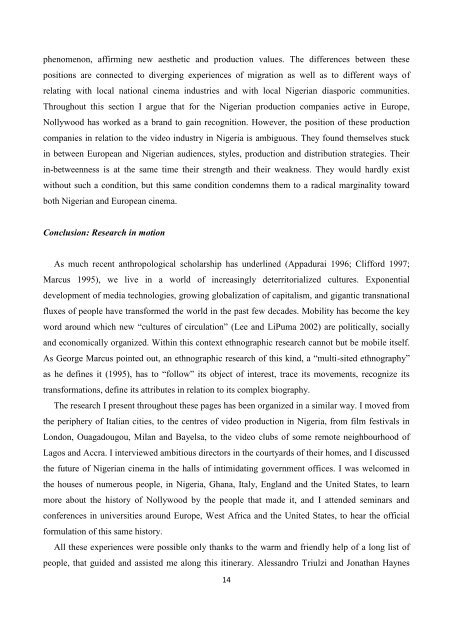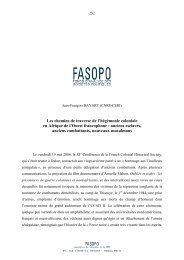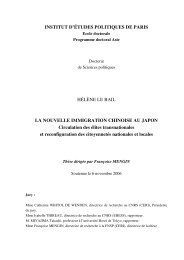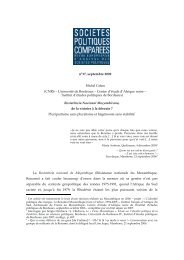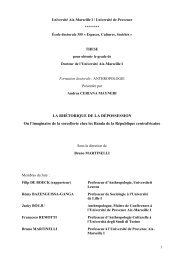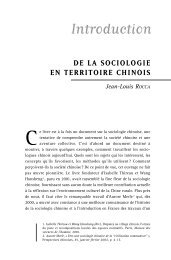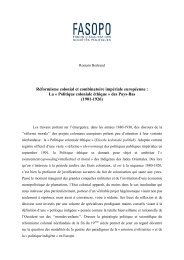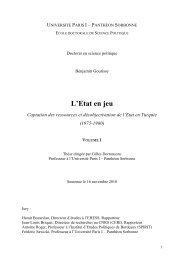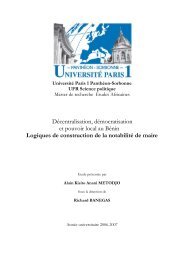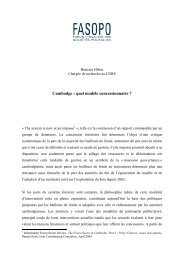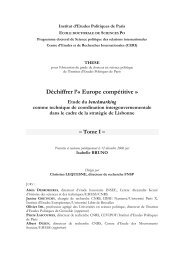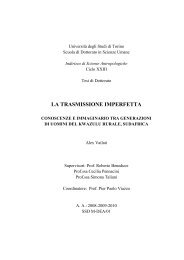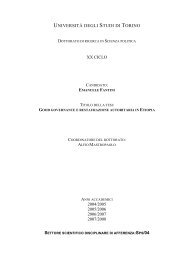phenomenon, affirming new aesthetic and production values. The differences between thesepositions are connected to diverging experiences of migration as well as to different ways ofrelating with local national cinema industries and with local Nigerian diasporic communities.Throughout this section I argue that for the Nigerian production companies active in Europe,Nollywood has worked as a brand to gain recognition. However, the position of these productioncompanies in relation to the video industry in Nigeria is ambiguous. They found themselves stuckin between European and Nigerian audiences, styles, production and distribution strategies. Theirin-betweenness is at the same time their strength and their weakness. They would hardly existwithout such a condition, but this same condition condemns them to a radical marginality towardboth Nigerian and European cinema.Conclusion: Research in motionAs much recent anthropological scholarship has underlined (Appadurai 1996; Clifford 1997;Marcus 1995), we live in a world of increasingly deterritorialized cultures. Exponentialdevelopment of media technologies, growing globalization of capitalism, and gigantic transnationalfluxes of people have transformed the world in the past few decades. Mobility has become the keyword around which new “cultures of circulation” (Lee and LiPuma 2002) are politically, sociallyand economically organized. Within this context ethnographic research cannot but be mobile itself.As George Marcus pointed out, an ethnographic research of this kind, a “multi-sited ethnography”as he defines it (1995), has to “follow” its object of interest, trace its movements, recognize itstransformations, define its attributes in relation to its complex biography.The research I present throughout these pages has been organized in a similar way. I moved fromthe periphery of Italian cities, to the centres of video production in Nigeria, from film festivals inLondon, Ouagadougou, Milan and Bayelsa, to the video clubs of some remote neighbourhood ofLagos and Accra. I interviewed ambitious directors in the courtyards of their homes, and I discussedthe future of Nigerian cinema in the halls of intimidating government offices. I was welcomed inthe houses of numerous people, in Nigeria, Ghana, Italy, England and the United States, to learnmore about the history of Nollywood by the people that made it, and I attended seminars andconferences in universities around Europe, West Africa and the United States, to hear the officialformulation of this same history.All these experiences were possible only thanks to the warm and friendly help of a long list ofpeople, that guided and assisted me along this itinerary. Alessandro Triulzi and Jonathan Haynes14
have accompanied my research from its early days to its conclusion. Their warm support, theirinsightful comments and their lucid criticism profoundly influenced the structure and contents ofthis dissertation. Karin Barber, Lindiwe Dovey and Ramon Lobato have generously supported mywork, offering invaluable comments and suggestions. Without the help and the constant proximityof Vincent Omoigui and Rose Okoh my first trip to Nigeria would have not been possible.Furthermore, their friendship and their thoughts have provided an immeasurable inspiration to thiswork. Evans, Id and John’s invaluable hospitality made me feel at home in Lagos. They have beenmy family when I was in Nigeria. Jahman Anikulapo and Patrick Oloko made me discover theNigerian effervescent cultural life, they introduced me to Lagos’s secrets and made the experienceof living there become something that I will never forget.For their support, their collaboration, their direct and indirect help to the realization of thisproject I also thank: Cristina Ercolessi, Jean-François Bayart, Beatrice Hibou, Roberto Beneduce,Simona Taliani, Brian Larkin, Manthia Diawara, Mamadou Diawara, Ute Röschenthaler, MatthiasKrings, Onookome Okome, Goffredo Fofi, Livia Apa, Manuela Ribeiro Sanches, Anne Schumann,Shani Omari, Leon Tsambu, Anouk Batard, Bic Leu, Carmen McCain, Sophie Samyn, FunmiPierce, Simone Sandretti, Marco Perugini, Giovanna Santanera, Odia Ofeimum, Amaka Igwe,Tunde Kelani, Mahmood Ali-Balogun, Teco Benson, Kunle Afolayan, Izu Ojukwu, FemiOdugbemi, Francis Onwochei, Lancelot Imasuen, Fidelis Duker, Pedro Obaseki, Bond Emeruwa,Kene Mkparu, Mildred Okwo, Tony Abulu, Wale Ojo, Emem Isong, Vivian Ejike, Obi Emelonye,Stephanie Okereke, Desmond Elliot, Lucky Ejim, Emmanuel Isikaku, Yinka Akambi, HyginiusEkwasi, Emeka Mba, Afolabi Adesanya, Olufemi Ayeni, Busola Holloway, Bankole Sodipo,Adejoke Oyewunmi, Andrew Adeleye, Joy Ilibeno, Patrick Lee, Chike Ofili, Chris Idhero, AlfredSoroh, Moses Babatope, Steve Ayorinde, Shaibu Husseini, Derin Ajao, Gudi Widlok, AsareHackman, Fara Awindor, Francis Ameyibor, Salomon, Austin, Ben and all the members of theDepartment of English of the University of Lagos, Antonio Pezzano and all the members of theDepartment of Middle Eastern and African Studies of the University of Naples “L’Orientale”.I warmly thank my family and my best friends Sam, Miki, Emanuele, Giovo, Khyam, Isa andPhilip, Joana and Diana for being besides me in these years. And I thank Rozenn for all that she hasbeen to me since I met her: this work is dedicated to her.15
- Page 2 and 3: Università degli Studi di Napoli
- Page 4: P. 169 CHAPTER VII. Nollywood abroa
- Page 8: owner or any of his friends. Once t
- Page 12 and 13: Nollywood. From this analysis it tr
- Page 16: CHAPTER IDefining the field of enqu
- Page 19 and 20: wave of young scholars interested i
- Page 21 and 22: “Small screen cinema”: The hist
- Page 23 and 24: villagers could assemble to watch
- Page 25 and 26: content to an audience disappointed
- Page 27 and 28: event that made the industry. While
- Page 29 and 30: Pentecostal churches’ Sunday serv
- Page 31 and 32: the essential heterogeneity, fluidi
- Page 33 and 34: ) The social life of thingsWhen con
- Page 35 and 36: the art or fashion market, is accel
- Page 37 and 38: QuestionsNollywood, as a phenomenon
- Page 39 and 40: Throughout the three sections that
- Page 41 and 42: who was shooting a video in those d
- Page 43 and 44: The Nigerian video industry has lon
- Page 45 and 46: CHAPTER IIRegulating mobility, resh
- Page 47 and 48: The production crisisWhen the video
- Page 49 and 50: distribution than the video format
- Page 51 and 52: As Jora emphasizes through a number
- Page 53 and 54: impact on the video industry’s ec
- Page 55 and 56: systems of rules that regulate the
- Page 57 and 58: (Meagher 2003: 59). Informal market
- Page 59 and 60: distribution points for pirated goo
- Page 61 and 62: conducted by the numerous artists'
- Page 63 and 64: imperialism. In many cases the comb
- Page 65 and 66:
Governor Fashola seems to be losing
- Page 67 and 68:
CHAPTER III.From Nollywood to Nolly
- Page 69 and 70:
on the contrary tended to reduce th
- Page 71 and 72:
Emmanuel Isikaku, the president of
- Page 73 and 74:
you now have two distinct formation
- Page 75 and 76:
willingness to screen Nigerian film
- Page 77 and 78:
Paths of formalization (II): The di
- Page 79 and 80:
the United States and then in Ghana
- Page 81 and 82:
etween the video-boom era and the n
- Page 83 and 84:
will discuss further below, many of
- Page 85 and 86:
Nollywood is normally consumed, sho
- Page 87 and 88:
SECTION IITHE “NOLLYWOODIZATION
- Page 89 and 90:
transnational reformulations of the
- Page 91 and 92:
time, metaculture tends to develop
- Page 93 and 94:
CHAPTER IVWhen the Nigerian video i
- Page 95 and 96:
Haynes’ skepticism about “name
- Page 97 and 98:
production about the phenomenon sta
- Page 99 and 100:
epresent his national identity, bot
- Page 101 and 102:
happened even if, as I will discuss
- Page 103 and 104:
consciousness, but as the true, aut
- Page 105 and 106:
is not. 84 This debate has often as
- Page 107 and 108:
the world in our home videos is all
- Page 109 and 110:
“Nollywood” and the Nigerian vi
- Page 111 and 112:
Nigerian productions in English, ar
- Page 113 and 114:
in terms of both the industrial inf
- Page 115 and 116:
it is possible to say that yet no N
- Page 117 and 118:
and on children selling snacks alon
- Page 119 and 120:
To give their films a plot, many do
- Page 121 and 122:
Within this context it might be imp
- Page 123 and 124:
epresent the industry are those tha
- Page 125 and 126:
What seems to be the major challeng
- Page 127 and 128:
Amongst the numerous festivals that
- Page 129 and 130:
ather documentarian orientation, as
- Page 131 and 132:
It is important to underline here t
- Page 133 and 134:
economic and social reality from wh
- Page 135:
The reaction that the international
- Page 138 and 139:
Marco Perugini, a sound and light t
- Page 140 and 141:
within Nollywood since the re-intro
- Page 142 and 143:
My intention in this chapter is to
- Page 144 and 145:
with foreign “White” media cont
- Page 146 and 147:
esemblance” ([1953] 1986: 32) bet
- Page 148 and 149:
The second problem relates to the s
- Page 150 and 151:
while the semantic approach has lit
- Page 152 and 153:
however, the structure of meaning t
- Page 154 and 155:
According to the same melodramatic
- Page 156 and 157:
develop widely accessible stories,
- Page 158 and 159:
condition, the Nigerian videos’ m
- Page 160 and 161:
dramatic item, but they allow them
- Page 162 and 163:
on the background, the sound of the
- Page 164 and 165:
profoundly condition the production
- Page 166 and 167:
“experienced in ‘reading’ and
- Page 168 and 169:
and stable moral constituency whose
- Page 170 and 171:
emergence of diasporic and migrant
- Page 172 and 173:
Migrant and diasporic filmmaking ha
- Page 174 and 175:
distribution, a position that he de
- Page 176 and 177:
Nollywood abroad: Defining the hist
- Page 178 and 179:
Immigrant Eyes (2010) and Amazing W
- Page 180 and 181:
the profits (image II). Furthermore
- Page 182 and 183:
while excluding others. To better d
- Page 184 and 185:
As I mentioned above the work of GV
- Page 186 and 187:
created by the language barrier, an
- Page 188 and 189:
arena in which in most of the cases
- Page 190 and 191:
Afrocentric images from and of the
- Page 192 and 193:
version of “Afrocentric” tradit
- Page 194 and 195:
CONCLUSIONVideos’ mobility and Ni
- Page 196 and 197:
New modes of operation emerged, and
- Page 198 and 199:
industry. This shift is provoking i
- Page 200 and 201:
authoring than our ideology and our
- Page 202 and 203:
the audience to interrogate the fil
- Page 204 and 205:
Toward a redefinition of Nigerian c
- Page 206 and 207:
FilmographyA Very Very Short Story
- Page 208 and 209:
L’industrie audiovisuelle au Ghan
- Page 210 and 211:
The Tenant. Dir. Onyekachi Ejim. Br
- Page 212 and 213:
Adesokan, Akin. 2004a. “How they
- Page 214 and 215:
Bazin, André. 1971. What is Cinema
- Page 216 and 217:
Eisenstadt, Shmuel N. 2000. “Mult
- Page 218 and 219:
---. 2007d. “Nnebue: The anatomy
- Page 220 and 221:
---. Forthcoming. “Karishika with
- Page 222 and 223:
---. 2005. “Social capital or ana
- Page 224 and 225:
Oduko, O.A. 1980. “Kung Fu tips t
- Page 226 and 227:
Punathambekar, Aswin. 2005. “Boll
- Page 228 and 229:
---. 2000. “Images of the reel th
- Page 230 and 231:
Aihe, Okoh. 1997. “Video: farewel
- Page 232 and 233:
Lasisi. Akeem. 2009. “Tinsel bene
- Page 234 and 235:
InterviewsAbulu, Tony (Nigerian dir
- Page 236:
Sandretti, Simone (Italian director


